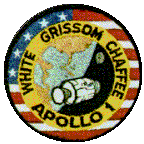To understand this you should take the political situation of the time into account. These were the days of the Cold War when the USSR was seen as the main threat to world peace. They had already launched the first communications satellite - Sputnik in 1957. This was the reason for the formation of NASA on October 1, 1958.
In the wake of Sputnik in 1957, President Dwight D. Eisenhower responded to the Soviet challenge and to public concern and excitement by reorganizing the American space effort. One step was to create a new government agency to conduct civilian space exploration. In 1958 congress established the new agency-the National Aeronautics and Space Administration (NASA). The armed services retained control of separate military space programs.
Prior to the creation of NASA, ongoing studies in aeronautics and space science were conducted under the auspices of the Department of Defense's Advanced Research Project Agency, the Naval Research Laboratory, the Army Ballistic Missile Agency, and the National Advisory Committee on Aeronautics. NASA acquired many scientific and technical programs from these agencies after its formation.
The new agency was allowed to set its own goals. The immediate goals were
As a new enterprise, space exploration confronted an array of difficult scientific and technical problems. Three challenges stood out: 1) developing rockets that could carry machines and humans into space; 2) learning about the space environment; and 3) taking the first steps toward human exploration.
Even with Project Mercury in its infancy, NASA managers contemplated projects to follow its completion. They realized that a large booster rocket would be necessary for heavy payloads and an eventual Moon mission.
The Army Ballistic Missile Agency (ABMA), in Huntsville, Ala., under the technical direction of Wernher von Braun (1912-1977), was already working on a new large rocket, the Saturn. In July 1960, the Department of Defense transferred the ABMA and its large booster projects to NASA. This formed the basis for the George C. Marshall Space Flight Center.
This transfer reflected President Eisenhower's policy that civilian and military space programs should be separately managed, but work closely together.
On April 12, 1961, cosmonaut Yuri Gagarin successfully orbited the Earth & returned safely. Another first for the Soviet Union. At this time they were thought to be at least 10 years ahead of the USA.
President John F. Kennedy had assumed office in January 1961.
Immediately after Gagarin's flight, President Kennedy wanted to know what the United States could do in space to take the lead from the Soviets. Vice President Lyndon Johnson polled leaders in NASA, industry, and the military. He reported that "with a strong effort" the United States "could conceivably" beat the Soviets in sending a man around the Moon or landing a man on the Moon. As neither nation yet had a rocket powerful enough for such a mission, the race to the Moon was a contest that the United States would not be starting at a disadvantage.
This quote is from his speech to Congress on May 25, 1961.
"...if we are to win the battle that is now going on around the world between freedom and tyranny, the dramatic achievements in space which occurred in recent weeks should have made clear to all of us, as did Sputnik in 1957, the impact of this adventure on the minds of men everywhere... Now it is time to take longer strides-time for this nation to take a clearly leading role in space achievement, which in many ways may hold the key to our future on Earth. ...we have never made the national decisions or marshaled the national resources required for such leadership. We have never specified long-range goals on an urgent time schedule... Space is open to us now; and our eagerness to share its meaning is not governed by the efforts of others. We go into space because whatever mankind must undertake, free men must fully share...
I believe that this nation should commit itself to achieving the goal, before this decade is out, of landing a man on the Moon and returning him safely to the Earth. No single space project...will be more exciting, or more impressive to mankind, or more important...and none will be so difficult or expensive to accomplish...".
President John F. Kennedy, May 1961
I have always believed that the space programs of both countries were & still are more military than scientific. No country would be prepared to spend the vast amount of time, resources & money purely on scientific research. This was always the prime objective of the Soviet government & certainly how the US government saw it.
Soviet space effort 10 years ahead of U.S., report asserts
By NICHOLAS C. CHRISS
Copyright 1987 Houston Chronicle
The Soviet Union has used the achievements and successes of its manned space flight program to "accelerate its drive to achieve military superiority in space," a new Pentagon study says.
As a result, according to the study - entitled "The Soviet Space Challenge" - the Soviets have come "dangerously close" to achieving a goal of controlling space for military purposes.
The study quotes a sentence from the "Dictionary of Basic Military Terms, USSR, 1965," which states: "Mastery of Space is an Important Prerequisite for Achieving Victory in War."
It goes on to state: "Most of the Soviet space program is not generally made public. As this publication documents, the greatest part of the Soviets' effort in space is dedicated to their military objectives.
"Because the Western democracies, particularly the United States, have directed a large part of their space resources and technology toward other goals, and some items have lacked clear goals, we have allowed the Soviet Union to come dangerously close to achieving its miliary objectives in space. The Soviets have methodically designed their space systems to fight a war in space."
The Soviet space program is the world's "most extensive, robust and dynamic space program in the world today," with expenditures of $80 billion during the last decade, the study said.
At the time of Apollo 11 the USSR had a successful unmanned moon exploration program under way.
Luna was a series of 24 lunar probes launched by the former USSR. 11 were successful and achievements of the series were great: The first man made object to reach another planetary body (Luna 2, 1959). The first pictures sent back of the far side of the Moon (Luna 3, 1959). The first probe to soft land on another planetary body (Luna 9, 1966). The first probe to orbit another planetary body (Luna 10, 1966). The first soil return to Earth from another planetary body (Luna 16, 1970). The first Lunar rover Lunokhod (unmanned) (Luna 17, 1970).
This shows the importance to the US (& the whole western world) of putting a man on the moon & explains my sometimes cynical views on the subject. Failure was not an option. Whether it was actually successful or not is irrelevant. The USSR certainly believed it was & never seriously attempted a manned moon project of their own.
http://www.nasm.si.edu/exhibitions/attm/nojs/fs.htmlPS. I don't believe that space technology was sufficiently advanced for either country to contemplate a Mars mission in 1969. The strategic advantage of this is debatable.











